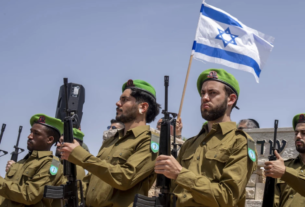On March 3, 2025, Israeli drone strikes in Rafah killed two Palestinians and injured three others, intensifying tensions as ceasefire negotiations stall. The attack comes amid growing uncertainty over the future of the fragile truce.
The ceasefire, established on January 19, 2025, was intended to ease hostilities and allow humanitarian aid into Gaza. However, negotiations for an extension have reached an impasse, leaving the situation unstable.
Hamas demands a permanent end to Israeli military operations before agreeing to any ceasefire extension. Israel, in contrast, proposes a temporary truce with strict conditions, citing security concerns.
Both sides blame each other for ceasefire violations, increasing the likelihood of renewed violence. The deadlock has worsened conditions in Gaza, where an Israeli blockade has led to severe shortages of essential goods.
“Hamas will not accept an extension without a full withdrawal,” a senior official stated. The group insists that any truce must include a long-term resolution, rejecting Israel’s offer of a 50-day pause.
Israeli officials argue that an indefinite ceasefire would allow Hamas to rearm and prepare for future attacks. They warn that without security guarantees, a lasting peace remains impossible.
Israel has intensified restrictions on Gaza, limiting the entry of food, fuel, and medical supplies. The blockade has caused sharp price increases, making basic necessities unaffordable for many residents.
The United Nations has warned of worsening humanitarian conditions and called for immediate action to ensure aid access. With supplies running low, civilians face increasing hardships as the conflict continues.
“The ceasefire has failed to bring stability,” a Gaza resident said, reflecting growing frustration. The latest attack in Rafah adds to a string of incidents that threaten to derail diplomatic efforts.
Israeli drone strikes have targeted suspected militant sites, while Hamas accuses Israel of deliberately undermining peace talks. Military officials claim the strikes are defensive responses to security threats.
Egypt, a key mediator, has urged both sides to continue negotiations and avoid escalation. Officials in Cairo are working to bridge differences between Hamas and Israel, but progress remains slow.
Egypt has proposed phased concessions to extend the ceasefire, but neither side is willing to make significant compromises. Diplomatic sources suggest that talks have stalled with little hope for an immediate breakthrough.
Tensions have spread beyond Gaza, leading to violence in Israel. In Haifa, a Palestinian citizen carried out a stabbing attack, killing one person and injuring four others before being shot by police.
Hamas praised the attack, calling it a “heroic act,” further inflaming hostilities. Israeli security forces have increased patrols in major cities to prevent further incidents.
The Israeli government is facing internal pressure over its handling of the ceasefire. During a parliamentary session, families of victims protested, highlighting public frustration with ongoing violence.
Prime Minister Benjamin Netanyahu has struggled to address both security concerns and demands for peace. Political divisions within Israel have made it difficult to take decisive action.
Israel has also expanded military operations beyond Gaza, targeting Hamas-linked sites in Syria. An additional attack off Gaza’s coast resulted in more Palestinian casualties.
The regional dimension of the conflict raises concerns about a broader escalation. With violence spreading, neighboring countries fear instability could worsen.
Hamas insists that a full ceasefire plan, including the phased release of Israeli hostages, must be implemented. The lack of progress in negotiations has prolonged uncertainty, with no clear resolution in sight.
With talks stalled and military actions increasing, Gaza faces a deepening humanitarian crisis. The ongoing restrictions and airstrikes are making life even harder for civilians caught in the conflict.
The risk of renewed war continues to grow as diplomatic efforts fail. Without a breakthrough, the situation is likely to deteriorate further.




